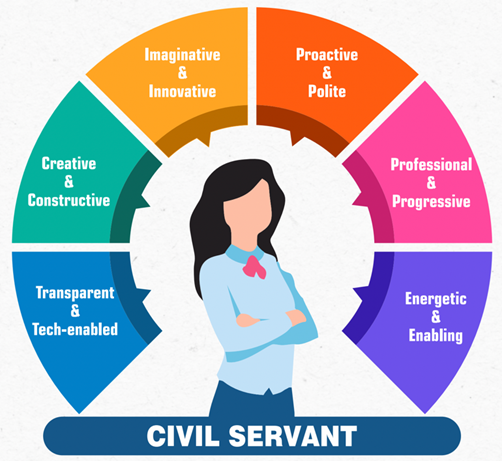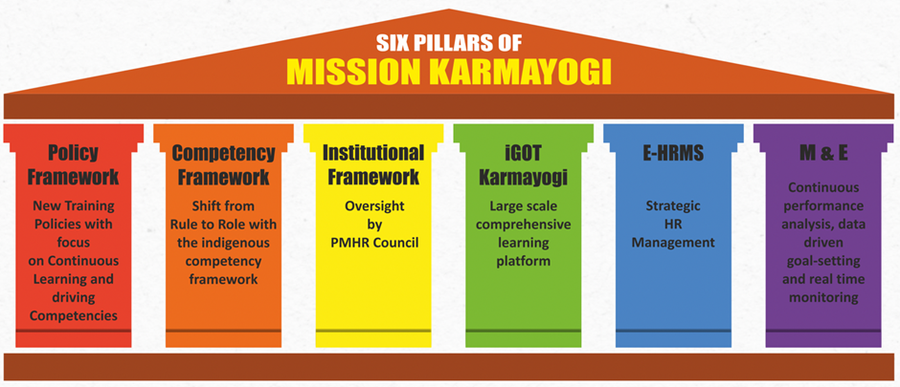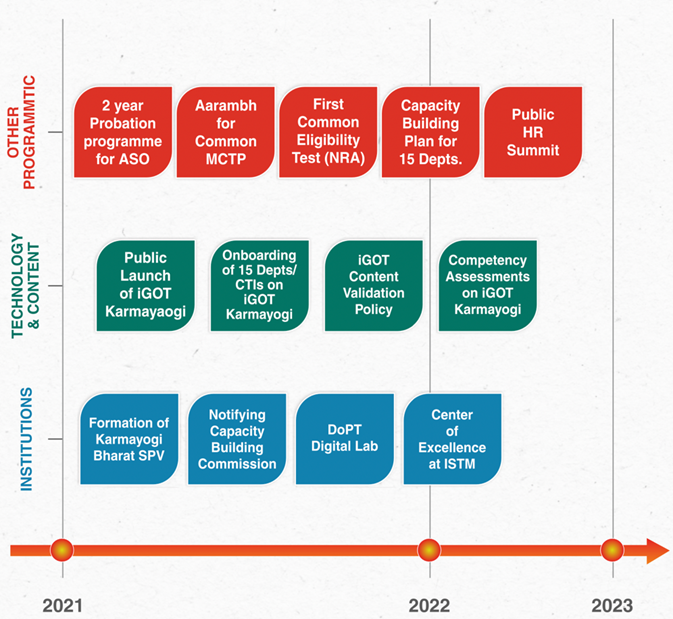In News:
- As Prime Minister Narendra Modi leads the NDA government into its ninth year, a silent reform of capacity building mechanism within the government is likely showing results in the Indian Railways.
What’s in today’s article:
- About Mission Karmayogi (Objective, Need, Features, Pillars, Institutional Structure, etc.)
- News Summary
About Mission Karmayogi:
- Referred to as the biggest bureaucratic reform initiative of independent India, the Union government launched Mission Karmayogi in September,
- Objective: To transform capacity-building in the bureaucracy through institutional and process reforms.
- Mission Karmayogi is a scheme that exhorts the civil servant to maintain a very high standard of conduct and behaviour so that he earns the trust of the people and is emulated by his peers and subordinates.
Need for the reform:
- Civil Servants play a vital role in formulating policy and executing delivery at the cutting edge.
- However, the current civil services capacity building landscape was marred with the following challenges:
- Existing training policy interventions were sporadic and largely confined to individual and intermittent innovations;
- Stereotyped working in silos or compartments, rather than an overall unifying vision and understanding of national priorities;
- Lack of a lifelong and continuous learning environment for all civil servants;
- Barriers to exchange of knowledge preventing collaborative working.
- Moving from a RULES-BASED to a ROLES-BASED HR management system.
Prime Minister’s vision of Civil Servant-Karmayogi for the nation:

Pillars of the Mission:

Salient Features of the Scheme:
- The transition from Rules Based to Roles Based Human Resource (HR) Management - The focus is to allocate jobs to the civil servants based on their competencies.
- On-Site Learning to complement Off-Site Learning - It is a training given to the civil servants on-site.
- An ecosystem of shared training infrastructure - Civil servants to adapt to an ecosystem of shared learning materials, institutions and personnel.
- Framework of Roles, Activities and Competencies (FRACs) approach - All civil services positions to be calibrated under this approach. Also based on this approach, all learning content will be created and delivered to every single government entity.
- Behavioural, Functional and Domain Competencies - Civil Servants to build their competencies in their self-driven and mandated learning paths.
- Co-creation of the common ecosystem by all the Central Ministries, Departments and their organizations - This is a way to create an ecosystem of learning through an annual financial subscription for every employee.
- Partnership with learning content creators - Public training institutions, universities and individual experts will be enabled to be a part of this capacity-building measure.
Institutional Structure:

- PM’s HR Council is the apex body to provide strategic direction to capacity building reforms.
- Cabinet Secretariat Coordination Unit works to monitor progress and execution and overseas plans.
- Capacity Building Commission works to harmonize training standards, create shared faculty & resources and facilitate world class learning.
- Karmayogi Bharat SPV owns and operates the online platform iGOT-Karmayogi to facilitate world class learning.
Action Plan (2021-23):

News Summary:
- Recently, the Capacity Building Commission has identified 12 friction points that can spoil the travel experience of customers; and four level of employees, who potentially make or mar the impression the customers carry back home.
- The Commission was set up by the Indian Railways, under Mission Karmayogi, in April 2021.
- The Commission is training all these (four) categories of officers across the nation, around one lakh people, to be citizen friendly.
- A similar exercise is being initiated in the police departments in the Union territories. The project involves training Master Trainers who will then engage with constables and inspectors.
- The exercise has the backing of the Prime Minister’s Office, with the specific mandate to improve customer interface and experience across sectors.










